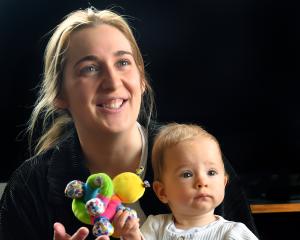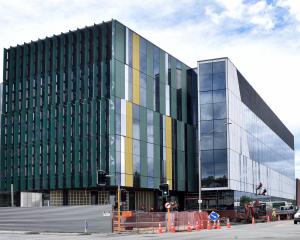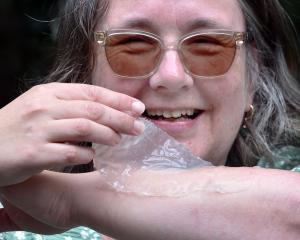
The spectre of hospital services shifting to Christchurch is an often-voiced concern in the South, but there is nothing to worry about, Canterbury DHB CEO David Meates tells Eileen Goodwin.
David Meates says he has a "wry chuckle" whenever he hears claims that Canterbury District Health Board is trying to empire-build or draw more patients from the South.
Those attitudes were prevalent in Christchurch a few years ago, he admits, but have largely gone.
"What are all these other services that people think need to come to Canterbury?
"What may surprise you is Canterbury needs a strong Southern District Health Board that’s able to meet most of the needs of its community.
"We don’t want to be bringing more care into Canterbury," the Canterbury and West Coast chief executive told the Otago Daily Times.
Given the well-documented history, people may indeed be sceptical that Canterbury is not angling for more centralisation.
Mr Meates says the numbers of patients travelling from the South for services in Christchurch is relatively small, and he wants to keep it that way.
Questions remain about high-level services, notably cardiothoracic surgery and neurosurgery, and how best to provide them in the long term.
They are services that rightly attract public attention; Mr Meates calls them "touchstones".
He says the third "touchstone" was tertiary-level child cancer treatment, which Dunedin lost years ago.
While he deflects some questions, Mr Meates is remarkably forthright compared with most DHB bosses.
He is happiest talking up the shift in Canterbury health that involves keeping patients out of hospitals, rather than drawing more in.
Mr Meates does not hold back when describing how bad things were before the changes. Indeed, he seems to relish it.
"Canterbury used to be one of the most conservative, traditional inward-looking entities.
"To start off with ... they had thrown rocks at each other for decades.
"We were an exemplar of just how bad it was."
GPs, hospital doctors, pharmacists — he calls them "old fractious fighting tribes" — traditionally blamed each other for whatever was going wrong.
A common criticism of New Zealand district health boards is that they have struggled to move away from acting like hospital boards.
Canterbury appears to have managed that shift.
An example: Canterbury GPs presented the business cases for hospital builds to the Government’s capital investment committee.
"That is unheard of in this country," he says.
Mr Meates says he considers Canterbury’s entire health workforce of 18,500 people as employees, although only 10,000 of them are directly employed.
"We think and talk about them as part of our workforce."
Some direct DHB employees are based in civic and community organisations.
"We have deliberately blurred all the boundaries."
Without the shift, another Christchurch Hospital would have been needed, on top of the existing one, by 2020, plus another 2000 aged-care beds and 20% more GPs.
"Even if we could afford it, where would the workforce come from?
"Southern needs to go through a similar journey. We’ve made it look really simple, but it’s been hellishly complex.
"The reason why the health system here didn’t implode with the earthquakes is that we could shift and change it."
The controversial part is that the system explicitly directs patients into the private sector if they can afford it.
"If [patients] can’t afford to go private they’re into the public system, but actually, if you’ve got health insurance, let’s have the conversation instead of having it as a dirty secret.
"If you’ve got health insurance, this is the pathway you could go," he says.
"Or, as a health system, [we say] ‘we don’t fund this’, so we’re right upfront with people.
"With the openness and transparency the community now feel they’re being treated fairly and equitably and no matter where they go, they are getting the same response," he says.
It’s not mentioned by Mr Meates, but the charity hospital in Christchurch founded in 2007 by surgeon Phil Bagshaw is presumably an important cog in a system that appears to be calibrated more closely with patients’ incomes.
Mr Meates can reel off an array of statistics to illustrate Canterbury’s successes.
Demand for acute hospital care has been "flat" since 2008 despite the population growing by about 75,000 people, and the proportion of older people attending the emergency department is down.
Five hundred fewer people are in aged residential care than in 2007.
Acute care and ED visits are important signs because they measure whether people, particularly the elderly, have been pushed into the community without adequate support.
"We’re running most of our health system now with real live time data. This is the bit people can’t quite work out how we’re doing it."
Of course Canterbury is under strain, and recently posted a $37million deficit, but that’s a direct consequence of the earthquakes, Mr Meates says.
Canterbury, which has taken the West Coast DHB under its wing, is a powerful DHB that has the organisational heft to stand up for itself.
It had a bitter row with the Ministry of Health over funding and clashed with it over hospital construction in Christchurch and Greymouth.
Mr Meates has some advice for dealing with the Government’s partnership groups, the instrument used to ensure the Ministry of Health maintains control of hospital builds.
"Make sure you get a really strong clinical leaders group in place."
Local clinicians need to sign off on all key bits of the design and ensure the partnership group is not acting in isolation, Mr Meates recommends.
"That’s the bit that’s really important to get right.’’Mr Meates says community input is crucial, along with local doctors and nurses.
"The building needs to fall out of people having a shared sense of purpose in the future.
"The easiest thing in the world is to build a building. The more complex one is to build the right facility."
Mr Meates has won respect from the senior doctors’ union in an increasingly politicised and stressed DHB sector.
Association of Salaried Medical Specialists executive director Ian Powell is happy to praise Mr Meates when asked for comment.
"He’s not simply a government puppet, he’s his own person, and he’s prepared to say to government something they might not want to hear, generally based on good advice from senior doctors and other staff with expertise."











